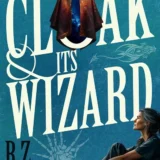
OBIR: Occasional Biased and Ignorant Reviews reflecting this reader’s opinion.

Pulp Literature Magazine #37 Winter 2023
Published by Pulp Literature Press, Langley, British Columbia, Canada, Winter 2022.
Managing Editor: Jennifer Landels, Senior Editor: Melanie Anastasiou, Acquisitions Editor: Genevieve Wynand, Poetry Editors: Daniel Cowper & Emily Osborne, Assistant Editors: Brooklyn Hook, Nik Kos, Melisa Gruger, Jeya Thiessen, Sierra Louie & Ellen Sapcey.
Cover art: Erebus and Terror at Beechey Island – by Kristina Gehrmann.
All Interior Illustrations: by Mel Anastasiou.
Told Under the Linden Tree – by Renée Sarojini Saklikar
Premise:
A time when stories are worth everything.
Review:
The situation is post-apocalyptic. Advanced tech continues in a fortress town which utilizes drones to keep tabs on a nearby refugee community in which the main character is a woman blacksmith who is intimately connected with a local Linden tree. There are no surviving books, but older people still know how to read. Currency, in terms of what’s most in demand for barter, consists of stories about the old days. Second in demand, seeds of plants no longer available locally. There are itinerant traders offering seeds and stories as they travel. They leave behind seeds, and written transcripts of their stories tacked up at meeting places. It’s an economy, of sorts.
Ordinarily, such a story would fall along traditional SF lines. I seem to recall a relatively recent movie in which the great, restorative “treasure” which would allow civilization to rebuild, offered by a feared and mistrusted travelling stranger, turned out to be an intact copy of the bible. Not a revelation which appealed to me. I dismissed the movie from my mind and do not have a copy in my collection. Which is why I can’t remember the title.
Point is, there’s always some gimmick, dreamed of, greatly desired, longed for, which once possessed would presumably restore prosperity and happiness to the world. A metaphor for hope. Alas, people forget that Pandora, after opening the box and releasing horrors on humanity, shut the lid in panic and trapped one little creature forever, namely “Hope.” It never got out. But science fiction apocalyptical prophecy is normally Pollyanna enough to include “Hope” in the form of ancient knowledge, as a theme or a dream. Not this story. Above all, there is no logical or scientific possibility offered as a potential solution. That is not what this story is about.
This is not about survival through a renaissance of technological knowledge. It is a story about creating and living myth as if it were the one reality that is real and genuine and the only means to survival and recovery. Imagine, if you will, a story taking place in the time Homer was composing the Illiad and the Odyssey, with everyone listening to the epics finding them fresh and inspiring and wonderful, not to mention true and authentic as they contained folk memories of the previous Mycenaean civilization. Cynics in the day undoubtedly denounced the tales as made-up B.S., but for them as wanted to believe, who desperately wanted to believe, Homer’s myths became the inspiration and basis for the classical civilization which was to follow.
In short, you don’t heal a collapsed civilization by handing out recovered technical manuals. You weave a glorious, consistent pattern of myth which “explains” the past, “justifies” the present, and provides a firm and confident belief system to build on. This story explores that act of creation. At least, that’s how I interpret it. I come away strangely confident humanity can survive the utter destruction of our modern world. All we need to rebuild a civilization, maybe not technological but sophisticated and content, is human imagination, and that our species has in abundance. Overall mood of this story? Tragic, but… soothing. Calming. Life can be lived.
Feature Interview – Pulp Literature interviews Renée Sarojini Salikar
Review:
I wrote my critique before I read this interview. Possibly, I missed the intent of the story. Yet, here Renée speaks much of the importance of hope in myth, in life, and learning to adjust emotionally and psychologically to natural things, to whatever happens. I like to think my interpretation is valid. One thing for sure, Renée’s story is beautiful and original. I state that as a fact.
Nothing Left – by Finnian Burnett
Premise:
Love is complicated when you are a machine.
Review:
Extremely short story, but vivid and evocative. As science advances, so does prejudice and oppression.
Ethan’s Pecs – by Finnian Burnett
Premise:
Do people fall in love with characters on TV? You betcha!
Review:
So short a story, it’s a prose poem. Packs in a lot of meaning in terms of complications and implications. If true, reassuring. If not true, worth believing anyway.
Zara’s Song – by JM Landels
Premise:
Zara has Queen Gwannyn kidnapped and taken into exile, then takes her place as her double.
Review:
Zara seems to be a natural-born doppelganger of the Queen. Born in poverty, raised by rebels, she knows enough about her “new” family to hate them, but to fool them? Zara comes loaded with spells and incantations to cloak her with acceptability sufficient to satisfy the suspicions of those who live with her. Trouble is, every now and then a distant relative, about whom she knows little, shows up and threatens to unmask her with unfamiliar familiarity. Her ready wit and access to rebel spy-intelligence get her out of many a tight spot. But maybe someday they won’t. Then what?
What I love about this “magic realism” set in a fictional medieval world is the very “modern” sense of paranoia suffusing even family success and national prosperity. After all, Machiavelli lived centuries ago, and even the most remote times in our past were awash in Machiavellian shenanigans or the threat of same. Too often, in science fiction and in fantasy, power structure relations (“politics”) is treated so simplistically as to be less than credible. “Uneasy lies the head that wears the crown” said Shakespeare in one of his plays or during a drunken spree (I forget which). This story makes that clear. Consequently, the story is not only entertaining, but credible and relevant to our time.
Blaze of the Universe – ( Poem) by Jude Neale
Premise:
Mozart and his influence.
Review:
A sweet poem demonstrating how Mozart, over time, transcended the narrow interests of his patrons.
Regarding Line 25600 of Your Income Tax Return – by Candence Mandybura
Premise:
What if the CRA (Canadian equivalent of the American IRS) knows what you REALLY think of them?
Review:
An individual files his electronic income tax form late at night mere minutes before deadline. Unbeknownst to him, every drunken utterance, not to mention his “little jokes” added to the form, have been noted and “understood.” So, a trio of government auditors show up at his home before he’s had time to eat breakfast, let alone sober up. They have taken all his suggestions seriously, and, as his inarticulate comments of last night do indeed fall under the more obscure regulations, he’s about to find out how that impacts his fate.
The CRA means well, of course. As they are always eager to admit, they have the best interests of every citizen at heart, no matter what sacrifice (on the part of the citizen) is necessary for the good of the nation citizen.
Which puts me mind of a vague memory of mine. Once, thirty or forty years ago, when I worked for Canada Customs, when talking to a sort of liaison officer from the CRA, the gentleman used a technical term to describe that portion of a citizen’s income that is not taxed. For the life of me I cannot remember the wording. However, in some way it indicated, if not outright implied, that non-taxable income would someday be declared illegal and that eventually everybody would be taxed on 100% of their income, no deductions. At the time, I assumed he was joking. Now, I’m not so sure.
At any rate, in this story the CRA representatives are confident and cheerful as they enforce the letter of the law, or at least the letter of the appropriate regulations. Charmingly, they’re determined to ensure the “best outcome” of the citizen’s heart-desires. Unfortunately for him, their definition of “best outcome” is a tad different from his, not to mention unexpected, startling, and panic-evoking.
I don’t want to give away a single example of what they do, because that would undermine the growing pyramid of fresh disaster that escalates exponentially the moment they begin leafing through the files on their clipboards. To those of us who undergo the annual torture, this light-hearted Kafkaesque satire inspires steady chuckling and amusement. Logically, CRA could never, never infringe on private rights and privilege to this extent and yet… and yet… it all seems so plausible, as if offering glimpses of what the CRA secretly wants to do and is quietly lobbying the Government to give them this kind of power. I dare say many an employee of the CRA would find this story dashed hilarious as well.
This is a delightfully amusing story with just enough of an anchor in real world to put a little bite into its message. Oddly enough, it left me feeling good about life in general. On-the-mark humour can do that for you.
Slip into My Fur – by Patrick Barb
Premise:
A Bear Rug has many uses.
Review:
Perhaps the most powerful revenge story I’ve read in years. It’s short but epic. I can see it becoming a modern myth. Certainly, one heck of a meaningful metaphor. I’m impressed, deeply impressed.
Falling for you – by Tom Jolly
Premise:
What if, in order for you to survive, your hidden superpower has to be the ability to fly. And what if you can’t?
Review:
Suddenly one in ten people world-wide develops a hidden superpower. One particular individual discovers he has the ability to teleport himself and/or others. Being an evil jerk, he teleports ten people atop a tall monolith in the middle of a desert. He’s left a message. One of them can fly, but doesn’t know it. There’s no other way to safely exit. Only the one who can fly can carry a phone out of the dead zone and call for help. Without food or water, they won’t last long in the blazing desert heat of the day or the freezing cold at night. They’re doomed, unless they figure out who can fly.
As you can imagine, complications ensue. All sorts of options spring to mind, none of them attractive. I’ll just call it a very interesting study in small group dynamics. Kept me wondering to the end how on earth they were going to solve their problem.
Even the opening seems problematic, but I once witnessed a man attempting to do that very action, and it was only the arrival of a burly police officer who grabbed him that prevented him from carrying out his ecstatic deed. So, yeah, I bought the psychology underlying that character’s motivation.
Despite the improbable circumstances, every option proposed is entirely logical or, at the very least, emotionally credible. An intelligent variation of the well-known 1939 Agatha Christie mystery novel AND THEN THERE WERE NONE, which has sold over 100 million copies to date (can’t go wrong with a good plot). A good, somewhat surreal, science fiction take on a classic problem. I found it fascinating, and the denouement most satisfying. Would have made a great OUTER LIMITS episode (the original series).
Golden – (Poem) by Catherine Lewis
Premise:
“The complete list of Chinese Surnames is short.” That can be a problem.
Review:
The solution is obvious, especially if one is aware of an aspect of Chinese culture which is different from Western culture. I was unaware, and it came as a complete surprise to me when I learned it late in life. But to explain would give away the gist of the poem. So, I’ll just say the poem offers a gentle insight into a little-known interaction of cultures.
Not What You Think – by Alan Sincic
Premise:
You live in a wooden house you carved inside a hollow tree. What happens when the bears arrive?
Review:
Winner of the 2022 Hummingbird Prize for Flash Fiction stories with “nerve and verve.”
You think a mile a minute when you climb a tree to escape from bears. They’re inside the tree. They can smell you, but they don’t know where you are… for the moment. It’s a long moment, one fraught with worry and fear. No easy solutions spring to mind.
But as the title suggests, it’s not what you think but what you do that matters. Trouble is, what can you do when there’s nothing you CAN do?
The solution is not for the literal-minded but is rather poetic in its way. Being afraid of bears, I have mixed feelings. One of them, out in the wild, came within thirty feet of me once, and there was no-where to run or hide. Fortunately, it had something else on its mind and, after giving me a cursory glance, wandered off. I may be Canadian, but I don’t like wandering along forest trails.
Heck, the park near where I worked in Burnaby was occasionally closed because of the presence of bears. And a bear sat and rested on my front porch in Coquitlam only minutes after I walked to the nearest bus stop at 5:00 a.m. one dark morning. On my way to work I was. I’d hate to have stumbled across it in the dark. And then there’s the time the North Shore coroner told me the best way to find remnants of missing persons was to examine bear scat. Not that the bears killed the people. It’s just, that if they come across a fresh corpse, dead of exposure or murder, they eat it.
Let me put it this way. When a full grown “tame” Grizzly was used to film a TV commercial in the offices of the warehouse where I worked, I refused to go to work that day. Some of my co-workers had pictures taken of them standing beside the bear. Not me, boyo. Not me. I have enough imagination to picture what can go awry.
Don’t get me wrong. I love nature and am fully supportive of efforts to prevent any animal from going extinct, and I believe bears should be left alone. Trouble is, they often share our living space, which was theirs to begin with, after all, but I don’t WANT to share my space with an apex predator. I can put up with chipmunks, but not bears. Call me flawed.
Anyway, an evocative, naturalist story, with my ability to appreciate it handicapped by my phobia about bears. Oddly, my phobia wasn’t triggered by the previous story “Slip into My Fur.” In that case, I identified with the bear. In this one, I identified with the potential victim. Makes a difference, I guess. But for some, it will be a life-affirming story with an ending they’ll greatly appreciate. It IS a good, well-written story exhibiting a detail-rich style. But difficult for me. Silly, but there it is.
The Dog I Loved – by MJ Malleck
Premise:
Is it possible the dog returned the love?
Review:
This story was runner-up in the 2022 Hummingbird prize.
Essentially a vignette dealing with childhood fantasy and a longed-for relationship that may have been delusional. Putting it another way, a study of how a child begins to interpret the world by attaching to the familiar. Perhaps every child goes through this phase one way or another. I think I did. Renders the story intensely personal and meaningful.
A Cold Place Between the Shores – (Graphic Art) Story by Mikael Lopez and art by Artyom trakbanov
Premise:
How to prevent a war between the Finns and the land of the Bears?
Review:
In the middle of winter, Finnish soldiers in white-cameo and armed with sub-machine guns confront men wearing bear costumes, or perhaps were-bears? Given the two Finnish-Soviet wars in the past, and the current Russian-Ukrainian war, this short graphic novel is loaded with metaphor bearing on the lives of millions. It’s complicated, and not at all straight-forward in terms of subtext.
Yet the plot is simple enough. A problem has arisen and it could mean war unless a joint-resolution can be agreed on. Does the ending offer a solution to current events? Only in the broadest sense, if the most charitable view of both sides is taken and wishful thinking comes true. Then again, we don’t find out exactly what happens. Perhaps, like many a treaty, the solution is a lie. If both sides want, not peace, but victory, then peace becomes an illusion. In that sense this story is open-ended.
One thing is portrayed accurately, the darkness of war and the deep gloom that pervades all thinking about war by the soldiers in the front line. What price survival? What price sacrifice? Many questions raised in this grim-dark graphic novel. Answers? There probably aren’t any. Up to the reader to decide. Powerful stuff.
Pretty Lies: Blow This Candle Out – (last few chapters) by Mel Anastasiou
Premise:
What happens when the dead attempt suicide?
Review:
I quote the opening: “It’s the golden summer of 1974 on Bowen Island, BC. Inspired by the story of Orpheus and Euridice, Jenny Riley tries to bring her dead boyfriend Joey back from the ghost world, but gives him up when he proves intent instead upon bringing her into the ghost world to stay. Malcolm, Adrian, and Chief Layton are all walking razors’ edges as Moira drags Jenny into her own perilous agenda for life after death.”
This is the conclusion of the serialized novel. I don’t want to give anything away. I’ll just say that choices are made, choices of lives, of worlds, and of futures. Are they the best choices? Depends. In some cases, perhaps, the choices were inevitable. In others, the best they can accomplish, a form of closure.
One matter worth pointing out: if you it is hard to make decisions in life, wait till you are forced to include choices made in your afterlife. Nothing gets easier. Far from it. Particularly when you can bounce back and forth between the two states of being, and especially when your bouncing is not under your control but a capricious act by someone else who is fully dead and proud of it.
Doesn’t sound restful, does it? Perhaps death is not the peaceful repose most people prefer to hope for. The entire novel is a philosophical debate conducted with modern lingo and smart remarks by living and dead, sometimes dead-living, characters enmeshed in a net-like tangle of love-sick assumptions and sad misunderstandings. Just like real life, extended into dead-life.
“The Grateful Dead” is a term found in the EGYPTIAN BOOK OF THE DEAD and adopted as the name of a popular rock band back in the day. The dead in this book aren’t grateful. They’re resentful, impulsive, and obsessively possessive, like so many Svengalis in training. Visiting the underworld solves nothing. And yet, given luck of the draw, sometimes things work out.
This book takes you by the hand and drags you into the abyss, the kind of abyss we are in the habit of fashioning for ourselves when we wonder what’s it all about. Don’t despair. There’s a lot to learn. And you’ll enjoy the surreal atmosphere evidenced along the way. Think of it as a dip in the ocean you’ll never forget. A remarkable experience.
CONCLUSION:
This issue remarkably varied in material, wildly varied in fact. And all of it extremely interesting, occasionally amusing, and always entertaining. Packed solid with good reading. Recommended.
Check it out at: < Pulp Literature Magazine #37 >








